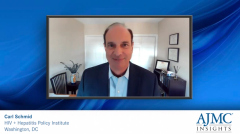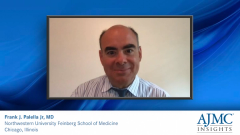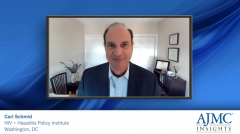
Improving Access and Adherence to PrEP
Dr Palella Jr highlights how clinicians support patient access to PrEP and what his experiences have shown him about patient adherence with the available oral therapies.
Episodes in this series

Frank J. Palella Jr, MD: Ways in which we navigate the health care system and try to ensure that patients are receiving their PrEP [preexposure prophylaxis] medication include involvement of a health care team, [with] myself as their prescribing physician. We have pharmacists on site that can educate regarding the medications and help monitor dispensing of medications. If it's injectable medication, our nurses are very involved regarding the timing and making sure that's communicated clearly with the patient for their next injection. Social workers and case workers play important roles as well. As you all know, a large number of persons who are in need of preexposure prophylaxis for HIV face other challenges, including some of the social determinants of health that I talked about. Poverty and stigma and substance use, mental healthcare issues, the need to not disclose their status, confidentiality, geography. We take these things into account when trying to optimize access to therapy in terms of outreach, education, promoting and reinforcing the need for such preexposure prophylaxis, and maintaining open dialogues with patients regarding their own specific situations. We try to customize our approach to the needs, understanding [the] perceptions of the patient.
We keep coming back to things that might either distract them from daily pill-taking or prevent access of picking up their medication, including potentially financial cost issues or third-party payer issues, but I keep coming back to some of those situational and social determinants of health. Do they have stable housing? Do they have a supportive environment? Are they dealing with other issues or challenges like mental health, substance use, domestic stability, and the geography of just being able to maintain the visits necessary to get the follow-up screening—and in cases of injectable therapy, getting the injections themselves? Another barrier can be a belief system that promotes self-acknowledgment that the risk exists. There's not only the availability of preventive strategies but the need to undertake them as well.
My perception of patient adherence to oral daily therapy for PrEP is not surprising to many. When people don't have a condition that they're diagnosed with, [like diabetes or high blood pressure or hypertension], the challenge of taking daily therapy is that it is preventive in this case for pre-exposure prophylaxis for HIV. It is undertaken in anticipation of a potential exposure as opposed to a response of a diagnosis. There are a lot of behavioral issues that go into that, including a patient's self-perception of their risk. It's not uncommon for some patients to be adherent to their daily PrEP as long as they feel they are at risk, usually through sexual encounters, but interrupt, delay, or even stop such therapy prevention if they don't perceive themselves to be at risk. You've heard of event-centered or event-based PrEP where individuals might take PrEP in anticipation of a potential sexual context starting 24 hours before, a dose 24 hours after, and another dose 24 hours after that. I think the challenges there include the fact that people aren't always able to anticipate just when and how the circumstances surrounding a sexual encounter might be a potential contact which can transmit HIV. For that, and for reasons that we've already talked about—cost issues, including social issues, not wanting to disclose diagnosis—there can be a lot of challenges with oral daily PrEP, particularly for young individuals or persons not taking pills for other indications. They can't center their PrEP around their daily pill-taking, the need to take pills or medications for other conditions, and group them together because it might be the only pill they're on, which I think is a disincentive for many people.
For patients without HIV who are on PrEP or need to be on PrEP, it's [the] disclosure of their risk for HIV that they're trying to avoid with many people because sometimes taking PrEP can be an unintentional disclosure of lifestyle, of types of sexual partners, of sexual activities, so there are potential social implications of daily pill-taking. [It] may or may not be accurate in what is implied, but nevertheless, any such disclosures are usually not desirable on the part of the patient.
This transcript has been edited for clarity.
Newsletter
Stay ahead of policy, cost, and value—subscribe to AJMC for expert insights at the intersection of clinical care and health economics.













